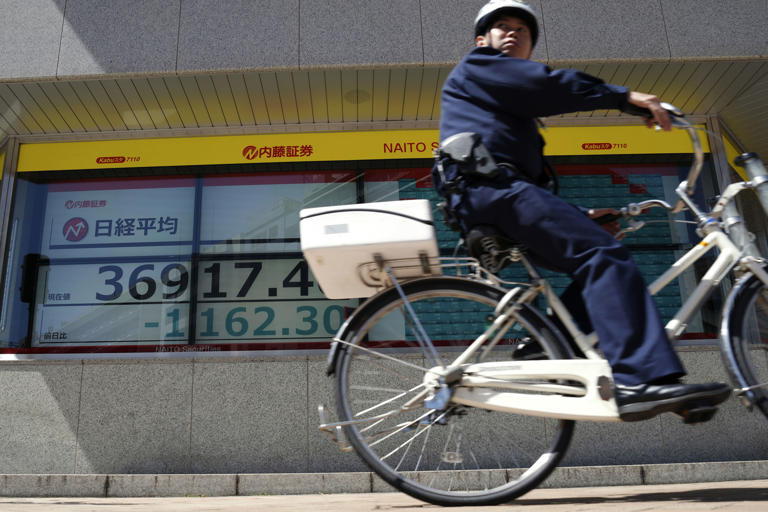The global financial markets experienced significant turbulence on Friday, with European markets opening lower and Asian stocks tumbling, particularly impacting Japan’s Nikkei, which slumped by 2.7%. This downward trend was largely attributed to heavy selling of semiconductor-related shares and other market heavyweights, compounded by escalating tensions in the Middle East.
The future for the S&P 500 and the Dow Jones Industrial Average also reflected this negative sentiment, with both down by 0.6% and 0.5%, respectively, indicating a cautious outlook among investors.
The spike in oil prices early on Friday, triggered by reports of Iran firing air defense batteries and explosions near the city of Isfahan, initially added to market jitters. However, these gains were short-lived, with prices giving up most of their gains by early morning European time.
In Europe, major indices faced losses, with Germany’s DAX down 1.1%, France’s CAC 40 slipping 0.8%, and the FTSE 100 in London dropping 0.6%. Similarly, in Asia, Japan’s Nikkei 225 led the losses, losing 2.7%, while other key indices such as Australia’s S&P/ASX 200, South Korea’s Kospi, and Hong Kong’s Hang Seng also recorded declines.
The semiconductor sector bore the brunt of the sell-off in Japan, with Lasertec being the largest loser, shedding 8.4% of its value. Other tech-related shares, including Renesas, Tokyo Electron, and Sony Group Corp., also registered significant declines.
The yen saw slight strengthening against the U.S. dollar, with the latter falling marginally to 154.47 Japanese yen from 154.64 yen. Investors are closely monitoring the Japanese central bank’s next move following its recent decision to raise its benchmark interest rate for the first time in 17 years, amidst persisting uncertainties in the global economy.
In the United States, Wall Street experienced a fifth consecutive day of losses, with the S&P 500 slipping by 0.2% and the Nasdaq composite dropping by 0.5%. The bond market’s upward trend in yields continued to exert pressure on stocks, as investors recalibrated their expectations regarding Federal Reserve policy.
Reports indicating a stronger-than-expected U.S. economy further fueled concerns about inflation and potential future interest rate hikes. Despite hopes of rate cuts earlier in the year, recent data suggest that the Fed may maintain its current stance until inflation shows signs of stabilizing.
In the commodities market, U.S. benchmark crude rose marginally to $82.22 per barrel, while Brent crude gained slightly to $87.18 per barrel. The euro also saw a modest uptick against the dollar, rising to $1.0654.
Overall, the global financial landscape remains volatile, with geopolitical tensions, inflation concerns, and central bank policies continuing to influence market sentiment and investor behavior.
